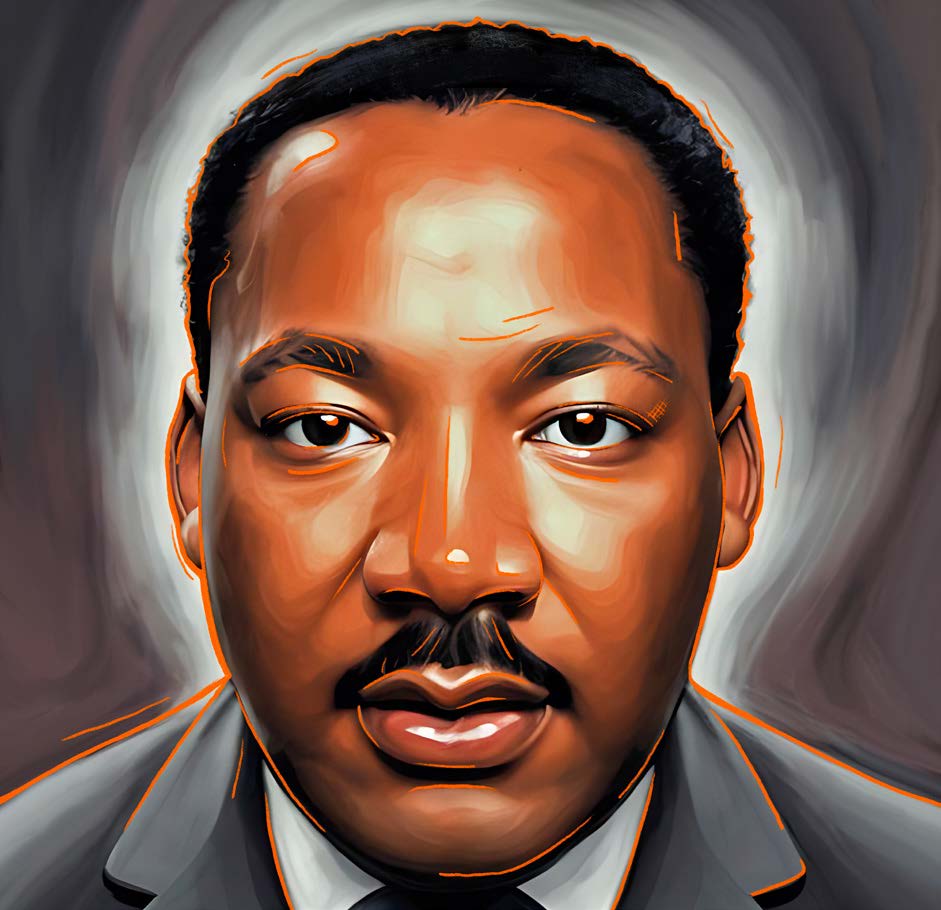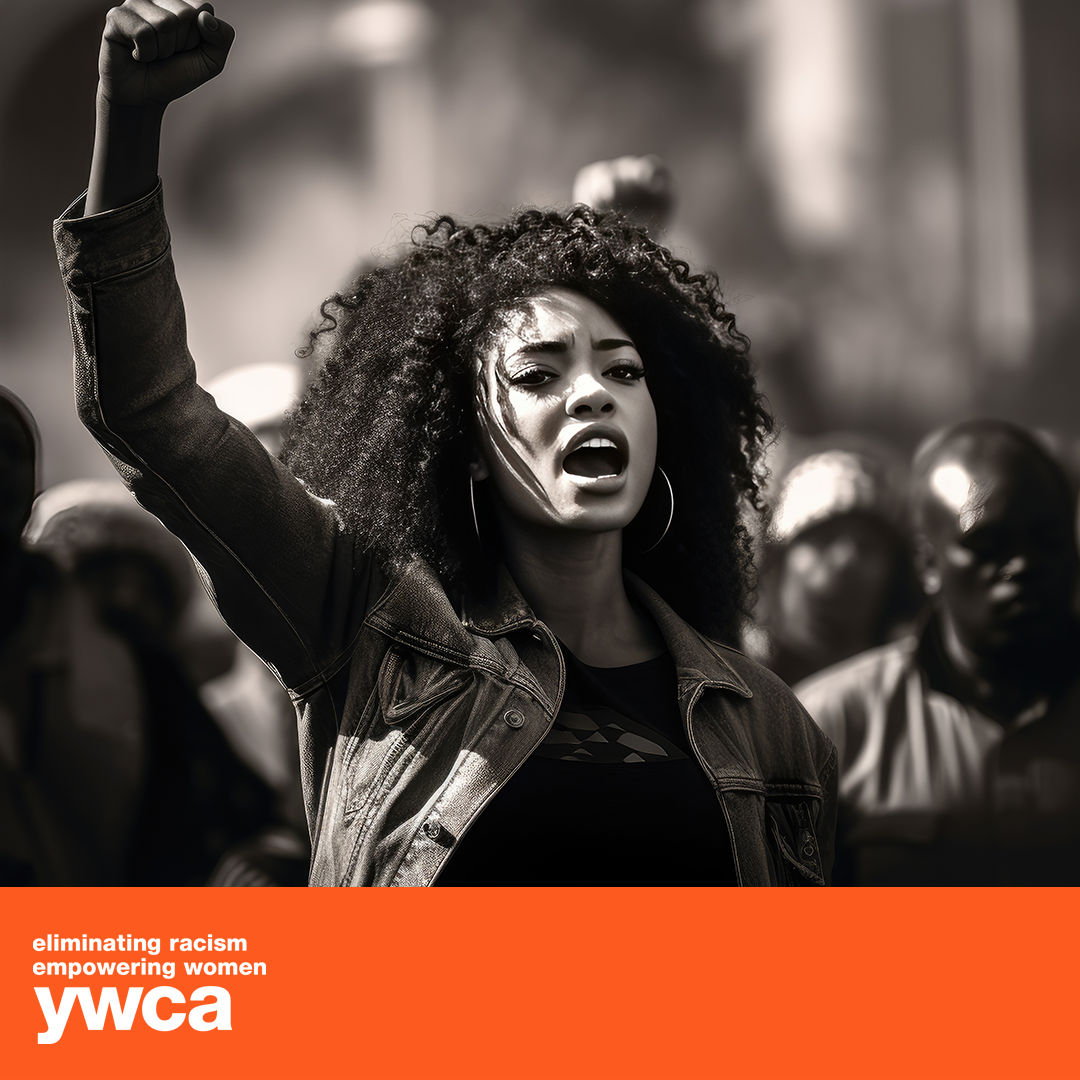The Rising Tide of Racial Consciousness

We are proud to rerelease “The Rising Tide of Racial Consciousness” by Dr. Martin Luther King Jr., originally published in the December 1960 issue of YWCA Magazine. The eloquence and booming veracity in his written words jump off the pages with the same strength he demonstrated in public, and they reverberate just as powerfully today: “Injustice anywhere is a threat to justice everywhere. Therefore, no American can afford to be apathetic about the problem of racial justice.”
The Rising Tide of Racial Consciousness
by Martin Luther King, Jr.
From YWCA Magazine 1960 - Abridged from an address at the Golden Anniversary Conference of the National Urban League
WHAT ARE THE FACTORS that have led to this new sense of dignity and self-respect on the part of the Negro? First, we must mention the population shift from rural to urban life. For many years the vast majority of Negroes were isolated on the rural plantation. They had very little contact with the world outside their geographical boundaries. But gradually circumstances made it possible and necessary for them to migrate to new and larger centers-the spread of the automobile, the great depression, and the social upheavals of the two world wars. These new contacts led to a broadened outlook. These new levels of communication brought new and different attitudes.
A second factor that has caused the Negroes' new self-consciousness has been rapid educational advance.
Over the years there has been a steady decline of crippling illiteracy. At emancipation only 5 percent of
the Negroes were literate; today more than 95 percent are literate. Constant streams of Negro students are finishing colleges and universities every year. More than 1,600 Negroes have received the highest academic degree bestowed by an American university. These educational advances have naturally broadened his thinking. They have given the Negro not only a larger view of the world, but also a larger view of himself.
A third factor that produced the new sense of pride in the Negro was the gradual improvement of his economic status. While the Negro is still the victim of tragic economic exploitation, significant strides have been made. The annual collective income of the Negro is now approximately $18 billion, which is more than the national income of Canada and all of the exports of the U.S.A. This augmented purchasing power has been reflected in more adequate housing, improved medical care, and greater educational opportunities. As these changes have taken place they have driven the Negro to change his image of himself.
A fourth factor that brought about the new sense of pride in the Negro was the Supreme Court's decision outlawing segregation in the public schools. For all men of good will May 17, 19 54, came as a joyous daybreak to end the long night of enforced segregation. In simple, eloquent, and unequivocal language the court affirmed that "separate but equal" facilities are inherently unequal and that to segregate a child on the basis of his race is to deny that child equal protection of the law. This decision brought hope to millions of disinherited Negroes who had formerly dared only to dream of freedom. Like an exit sign that suddenly appeared to one who had walked through a long and desolate corridor, this decision came as a way out of the darkness of segregation. It served to transform the fatigue of despair into the buoyancy of hope. It further enhanced the Negro's sense of dignity.
A fifth factor that has accounted for the new sense of dignity on the part of the Negro has been the awareness that his struggle for freedom is a part of a worldwide struggle. He has watched developments in Asia and Africa with rapt attention. On these vast prodigious continents dwell two-thirds of the world's people. For years they were exploited economically, dominated politically, segregated and humiliated by foreign powers. Thirty years ago there were only three independent countries in the whole of Africa-Liberia, Ethiopia, and South Africa. By 1962, there may be as many as 30 independent nations in Africa. These rapid changes have naturally influenced the thinking of the American Negro. He knows that his struggle for human dignity is not an isolated event. It is a drama being played on the stage of the world with spectators and supporters from every continent.
Determination and Resistance
This growing self respect has inspired the Negro with a new determination to struggle and sacrifice until first class citizenship becomes a reality. This is at bottom the meaning of what is happening in the South today. Whether it is manifested in nine brave children of Little Rock walking through jeering and hostile mobs, or 50,000 people of Montgomery, Alabama, substituting tired feet for tired souls and walking the streets of that city for 381 days, or thousands of courageous students electrifying the nation by quietly and nonviolently sitting at lunch counters that have been closed to them because of the color of their skin, the motivation is always the same-the Negro would rather suffer in dignity than accept segregation in humiliation.
This new determination on the part of the Negro has not been welcomed by some segments of the nation's population. In some instances it has collided with tenacious and determined resistance. This resistance has risen at times to ominous proportions. A few states have reacted in open defiance. The legislative halls of the South ring loud with such words as "interposition" and "nullification." Many public officials are going to the absurd and fanatical extreme of closing the schools rather than to comply with the law of the land. This resistance to the Negroes' aspirations expresses itself in the resurgence of the Ku Klux Klan and the birth of White Citizens Councils.
The resistance to the Negroes' aspirations expresses itself not only in obvious method of defiance, but in the subtle and skillful method of truth distortion. In an attempt to influence the minds of northern and southern liberals, the segregationists will cleverly disseminate half-truths. Instead of arguing for the validity of segregation and racial inferiority on the basis of the Bible, they set their arguments on cultural and sociological grounds. The Negro is not ready for integration, they say; because of academic and cultural lags on the part of the Negro, the integration of schools will pull the white race down. They are never honest enough to admit that the academic and cultural lags in the Negro community are themselves the result of segregation and discrimination. The best way to solve any problem is to remove the cause. It is both rationally unsound and sociologically untenable to use the tragic effects of segregation as an argument for its continuation.
The great challenge facing the nation today is to solve this pressing problem and bring into full realization the ideals and dreams of our democracy. How we deal with this crucial situation will determine our political health as a nation and our prestige as a leader of the free world. The price that America must pay for the continued oppression of the Negro is the price of its own destruction. The hour is late; the clock of destiny is ticking out. We must act now! It is a trite yet urgently true observation that if America is to remain a first-class nation, it cannot have second-class citizens.
Our primary reason for bringing an end to racial discrimination in America must not be the communist challenge. Nor must it be merely to appeal to Asian and African peoples. The primary reason for our uprooting racial discrimination from our society is that it is morally wrong. It is a cancerous disease that prevents us from realizing the sublime principles of our Judeo-Christian tradition. Racial discrimination substitutes an "I-it" relationship for the "I-thou" relationship. It relegates persons to the status of things. Whenever racial discrimination exists it is a tragic expression of man's spiritual degeneracy and moral bankruptcy. Therefore, it must be removed not merely because it is diplomatically expedient, but because it is morally compelling.
A National Problem
The racial issue that we confront in America is not a sectional but a national problem. Injustice anywhere is a threat to justice everywhere. Therefore, no American can afford to be apathetic about the problem of racial justice. It is a problem that meets every man at his front door.
There is need for strong and aggressive leadership from the federal government. There is a pressing need for a liberalism in the North that is truly liberal, that firmly believes in integration in its own community as well as in the deep South. There is need for the type of liberal who not only rises up with righteous indignation when a Negro is lynched in Mississippi, but will be equally incensed when a Negro is denied the right to live in his neighborhood, or join his professional association, or secure a top position in his business. This is no day to pay mere lip service to integration; we must pay life service to it.
There are several other agencies and groups that have significant roles to play in this all-important period of our nation's history; the problem of racial injustice is so weighty in detail and broad in extent that it requires the concerted efforts of numerous individuals and institutions to bring about a solution.
The Primary Responsibility
In the final analysis if first-class citizenship is to become a reality for the Negro he must assume the primary responsibility for making it so. The Negro must not be victimized with the delusion of thinking that others should be more concerned than himself about his citizenship rights.
In this period of social change the Negro must work on two fronts. On the one hand we must continue to break down the barrier of segregation. We must resist all forms of racial injustice. This resistance must always be on the highest level of dignity and discipline. It must never degenerate to the crippling level of violence. There is another way-a way as old as the insights of Jesus of Nazareth and as modem as the methods of Mahatma Gandhi. It is a way not for the weak and cowardly but for the strong and courageous. It has been variously called passive resistance, nonviolent resistance, or simply Christian love. It is my great hope that, as the Negro plunges deeper into the quest for freedom, he will plunge deeper into the philosophy of nonviolence. As a race we must work passionately and unrelentingly for first-class citizenship, but we must never use second-class methods to gain it. Our aim must be not to defeat or humiliate the white man, but to win his friendship and understanding. We must never become bitter nor should we succumb to the temptation of using violence in the struggle, for if this happens, unborn generations will be the recipients of a long and desolate night of bitterness and our chief legacy to the future will be an endless reign of meaningless chaos.
I feel that this way of nonviolence is vital because it is the only way to re-establish the broken community. It is the method which seeks to implement the just law by appealing to the conscience of the great decent majority who through blindness, fear, pride, or irrationality have allowed their consciences to sleep.
The nonviolent resistors can summarize their message in the following simple terms: we will take direct action against injustice without waiting for other agencies to act. We will not obey unjust laws or submit to unjust practices. We will do this peacefully, openly, and cheerfully because our aim is to persuade. We adopt the means of nonviolence because our end is a community at peace with itself. We will try to persuade with our words, but, if our words fail, we will try to persuade with our acts. We will always be willing to talk and seek fair compromise, but we are ready to suffer when necessary and even risk our lives to become witnesses to the truth as we see it.
I realize that this approach will mean suffering and sacrifice. It may mean going to jail. If such is the case the resistor must be willing to fill the jail houses of the South. It may even mean physical death. But if physical death is the price that a man must pay to free his children and his white brethren from a permanent death of the spirit, then nothing could be more redemptive. This is the type of soul force that I am convinced will triumph over the physical force of the oppressor.
This approach to the problem of oppression is not without successful precedent. We have the magnificent example of Gandhi who challenged the might of the British Empire and won independence for his people by using only the weapons of truth, noninjury, courage, and soul force. Today we have the example of thousands of Negro students in the South who have courageously challenged the principalities of segregation. These young students have taken the deep groans and the passionate yearnings of the Negro people and filtered them in their own souls and fashioned them in a creative protest which is an epic known all over our nation. For the last few months they have moved in a uniquely meaningful orbit imparting light and heat to distant satellites. Through_ their nonviolent direct action they have been able to open hundreds of formerly segregated lunch counters in almost 80 cities. It is no overstatement to characterize these events as historic. Never before in the U.S.A. has so large a body of students spread a struggle over so great an area in pursuit of a goal of human dignity and freedom. I am convinced that future historians will have to record this student movement as one of the greatest epics of our heritage.
Let me mention another front on which we must work that is equally significant. The Negro must make a vigorous effort to improve his personal standards. The only answer that we can give to those who through blindness and fear would question our readiness and capability is that our lagging standards exist because of the legacy of slavery and segregation, inferior schools, slums, and second-class citizenship, and not because of an inherent inferiority. The fact that so many Negroes have made lasting and significant contributions to the cultural life of America in spite of these crippling restrictions is sufficient to refute all of the myths and half-truths disseminated by the segregationist.
Yet we cannot ignore the fact that our standards do often fall short. One of the sure signs of maturity is the ability to rise to the point of self-criticism. We have been affected by our years of economic deprivation and social isolation. Some Negroes have become cynical and disillusioned. Some have so conditioned themselves to the system of segregation that they have lost that creative something called initiative. So many have used their oppression as an excuse for mediocrity. Many of us live above our means, spend money on nonessentials and frivolities, and fail to give to serious causes, organizations, and educational institutions that so desperately need funds. Our crime rate is far too high.
Constructive Action
Therefore there is a pressing need for the Negro to develop a positive program through which these standards can be improved. After we have analyzed the sociological and psychological causes of these problems, we must seek to develop a constructive action program to solve them. We must constantly stimulate our youth to rise above the stagnant level of mediocrity and seek to achieve excellence in their various fields of endeavor. Doors are opening now that were not open in the past, and the great challenge facing minority groups is to be ready to enter these doors as they open. No greater tragedy could befall us at this hour but that of allowing new opportunities to emerge without the concomitant preparedness to meet them.
We must make it clear to our young people that this is an age in which they will be forced to compete with people of all races and nationalities. We cannot aim merely to be good Negro teachers, good Negro doctors, or good Negro skilled laborers. We must set out to do a good job irrespective of race. We must seek to do our life's work so well that nobody could do it better. The Negro who seeks to be merely a good Negro, whatever he is, has already flunked his matriculation examination for entrance into the university of integration.
This then must be our present program: nonviolent resistance to all forms of racial injustice, even when this means going to jail; and bold, constructive action to end the demoralization caused by the legacy of slavery and segregation. The nonviolent struggle, if conducted with the dignity and courage already shown by the sit-in students of the South, will in itself help end the demoralization; but a new frontal assault on the poverty, disease, and ignorance of a people too long deprived of the God-given rights of life, liberty, and the pursuit of happiness will make the victory more certain.
We must work assiduously and with determined boldness to remove from the body politic this cancerous disease of discrimination which is preventing our democratic and Christian health from being realized. Then and only then will we be able to bring into full realization the dream of our American democracy-a dream yet unfulfilled. A dream of equality of opportunity, of privilege and property widely distributed; a dream of a land where men will not take necessities from the many to give luxuries to the few; a dream of a land where men do not argue that the color of a man's skin determines the content of his character; a dream of a place where all our gifts and resources are held not for ourselves alone but as instruments of service for the rest of humanity; the dreai:n of a country where every man will respect the dignity and worth of all human personality, and men will dare to live together as brothers-that is the dream. Whenever it is fulfilled we will emerge from the bleak and desolate midnight of man's inhumanity to man into the bright and glowing daybreak of freedom and justice for all of God's children.





